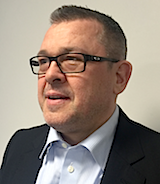ShoreTel's transformation journey as a global UC&C provider is increasingly cloud focused and its gaze has fallen on European expansion with the acquisition of contact centre provider Corvisa.
Mark Roberts, CMO at ShoreTel, said: "I see a modification in the way we are thinking about channels and how they make their money from the interaction and services. It is the same with unified communications. Our last quarter results showed this as we did well on revenue and beat the earnings forecasts.
"It is a cloudy world. If you are not moving your customer base, someone will do it for you. We spend a lot of time with partners and the programme is now structured to be neutral between cloud, hybrid and on premise. We have seen a lot of take-up there under the new points scheme because it is seen as balanced - it has normalised the behaviour in channel."
Cloud is in a strong growth phase - analysts talk of mid-20%. Driving that in EMEA is something recent for ShoreTel - in the last six months or so. "The North America cloud is growing great for us, and more than anything it is a question of keeping up with the market. Making sure the right bets are placed - which in a high growth era is not that easy."
All the case studies and collateral is geared to cloud as that is where the growth is, he adds.
"We are increasing the focus on the European market with the acquisition of Corvisa. We find that there is a lot of expertise in EMEA around contact centres, which perhaps does not seem to be there in the rest of the world.
"Corvisa gives us a stand-alone contact centre which doesn't need to run on ShoreTel switches - it can run on anybody's. That allows us to massively expand the opportunities and get a footprint in those larger deals that were previously denied. The Corvisa systems is highly customisable, with a SDK and APIs so that you can do authorisations etc. We also got SIP trunking."
In some ways, customers are ahead of channels in making the move to cloud, he suggested. "I've not seen a difference here between Europe and the US. I have seen conversation where the customer indicated they want to go cloud and the partner is still offering an on-premise solution. If you don't sell me a solution, I'll go elsewhere."
The two primary requirements for unified comms was compatibility with existing apps and integration - it is not total cost of ownership or ROI or price. "I think the channel partner that can have that conversation will do well in the long run. It means we can add a number of new partners who get cloud."

 Matthew Parker (pictured) is to lead IP Solutions as CEO following investment from Livingbridge. His appointment signals IP Solutions' growth ambitions.
Matthew Parker (pictured) is to lead IP Solutions as CEO following investment from Livingbridge. His appointment signals IP Solutions' growth ambitions.